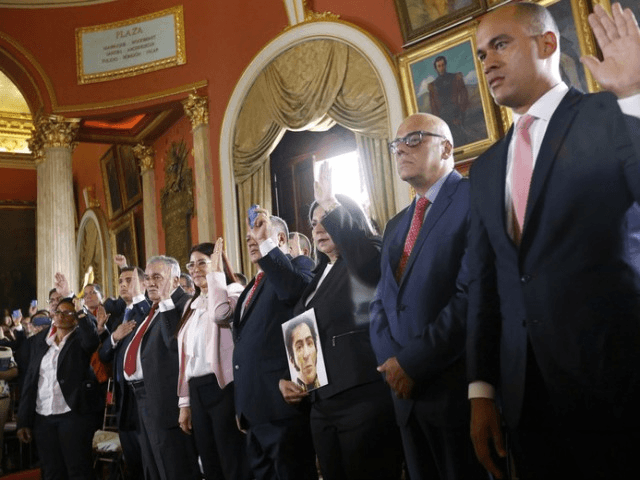Multiple reports citing U.S. officials Tuesday suggest that the Trump administration is preparing more sanctions against high-ranking Venezuelan socialist officials, following direct sanctions on dictator Nicolás Maduro.
Neither Reuters nor Bloomberg, which reported the potential sanctions, have found evidence that American officials are preparing to sanction Venezuela’s oil industry, the last remaining semi-functional sector of its economy.
The Bloomberg report, published first, claims that the Trump administration is preparing to freeze U.S.-based assets of up to 20 Venezuelan officials sometime this week. “The action could come as soon as Tuesday, though it may be delayed as the Trump administration seeks a coordinated international response in imposing penalties on the Maduro regime for undermining democracy in the South American country,” Bloomberg reported, citing two anonymous sources.
Reuters confirmed that new sanctions may be on the way, citing their own anonymous officials. The Reuters report adds that their sources claim the sanctions would look much like those placed on Maduro, acting to “freeze the individuals’ U.S. assets, ban them from travel to the United States and prohibit Americans from doing business with them.”
“We want to leave room to do more if Maduro’s actions continue, not do everything and everyone who remains all with one stroke,” an anonymous official told Reuters, as a way of explaining why the sanctions would not crack down on the oil industry yet.
The Miami Herald has suggested that a reason for the delay on further sanctions on Venezuela may be the appointment of Chief of Staff Gen. John Kelly, who once headed U.S. Southern Command and “is intimately familiar with Venezuela’s tumult.” Kelly, the Herald claims, would not delay the move because he “opposes more sanctions, but because he wants to vet and weigh in on the administration’s plan.”
The U.S. Department of the Treasury has nonetheless sanctioned Venezuela repeatedly in the past month. Shortly before the July 30 election to appoint a “national constituents’ assembly,” an unconstitutional legislative body which would usurp the power of the democratically-elected National Assembly, the Treasury unveiled sanctions freezing any assets Nicolás Maduro may have in the United States, as well as prohibiting Americans from conducting business with Maduro himself. At a White House press briefing, Secretary of the Treasury Steven Mnuchin told reporters that he would “consider” further sanctions, but did not specify on who or what.
Among the most prominent Venezuelan officials to remain out of the target of sanctions are Diosdado Cabello, a prominent chavista leader believed to be using his influence for the profit of an international cocaine trafficking cartel, and Vladimir Padrino López, the Minister of Defense, tasked with using the military to oppress and kill peaceful protesters.
A week before that announcement, the Treasury sanctioned a number of high-ranking Venezuelan officials, including electoral board head Tibisay Lucena and Tarek William Saab, appointed this weekend as the nation’s prosecutor general after the “constituents’ assembly” removed the legitimate prosecutor general, Luisa Ortega Díaz, from her post for investigating the July 30 election. Maduro award all those sanctioned replicas of a sword allegedly used by founding father Simón Bolívar.
U.S. sanctions against prominent chavistas are intended to keep them from continuing to profit off the oppression of their people. High-ranking Venezuelan officials have long maintained luxury properties and spent their money in wealthy South Florida neighborhoods like Cocoplum, Miami. One estimate suggested up to one thousand Venezuelan government officials do business in the United States, often sending their families to live there and avoid the severe shortages in food and medicine that the average Venezuelan cannot.
As Miami is also home to a large Venezuelan refugee community, confrontations between prominent chavistas and average Venezuelans in restaurants, cafes, and other public areas are becoming increasingly common, though they have also occurred and been caught on video in New York, Spain, and Australia, among other places with growing Venezuelan populations.

COMMENTS
Please let us know if you're having issues with commenting.